Lectures by the Venerable Master Hsuan Hua,
Given at Gold Mountain Monastery,
San Francisco, California, in 1974
The Sutra in Forty-two Sections Spoken by the Buddha
(Section 8 to 10)
----------------------------------------
Section 8
Abusing Others Defiles Oneself
The Buddha said, an evil person who harms a sage is like one who raises his head and spits at heaven. Instead of reaching heaven, the spittle falls back on him. It is the same with someone who throws dust against the wind. Instead of going somewhere else, the dust returns to defile his own body. The sage can not be harmed. Misdeeds will inevitably destroy the doer."
In this eighth section, the Buddha teaches us that we must not do bad deeds, that we must not harm people, because to harm others is just to harm oneself. If you slight others, you only slight yourself. If you are bad to others, it the same as being bad to yourself.
The Buddha said, n evil person who harms a sage is like one who raises his head and spits at heaven. Instead of reaching heaven, the spittle falls back on him. "an evil person" refers to someone who does bad deeds of every kind, while a sage is a worthy and virtuous person. When an evil person who has no virtue tries to harm a sage who has genuine virtue, it as if he were tipping back his head to spit at the sky. The spit doesn’t reach the sky, but instead falls back on his own face. This is to say that an evil person is really unable to harm a sage. He may think of a way to harm him, but in the end he still actually harming himself. In this world there are underlying principles of justice which govern all things, and which make it wrong to harm people.
It is the same with someone who throws dust against the wind. Instead of going somewhere else, the dust returns to defile his own body. If you face the wind and toss out a handful of dust, instead of flying forward, it will fly back to you and fall on your own body.
The sage cannot be harmed. Misdeeds will in evitably destroy the doer. You can slander a sage or really harm him, because when you cause misfortune for others, you will also bring misfortune upon yourself. It you who will have to undergo the retribution.
--------------------------------------------
Section 9
By Returning to the Source, You Find the Way
The Buddha said, deep learning and a love of the Way make the Way difficult to attain. When you guard your mind and revere the Way, the Way is truly great! "
In this ninth section, the Buddha is teaching cultivators to hear the Dharma and to contemplate it, to contemplate the Dharma and to cultivate it, to cultivate the Dharma and then to realize it. Cultivators should not only be able to discuss or to listen to the Buddhadharma, they should also able to put it into practice. It only counts when you actually go and do it.
The Buddha said, deep learning and a love of the Way make the Way difficult to attain. "Deep learning here refers to being well-read. Ananda, for instance, was fore most in learning. He could be called deeply learned. But someone who has only studied the Dharma and has not contemplated it as it is taught will never be able to understand the principles it contains. He relies on only rote memory and intellectual ability. Even if he has a sharp memory and can memorize a sutra, he won get any response. If he fails to contemplate the meaning and fails to cultivate according to it, it will ultimately be of no use to him. love of the Way " refers to cultivators who know that the Way is really excellent, but who don realize that originally the Way is just their own mind. It is not apart from their own mind. Those people go searching outside their mind for another Way. Although they long for and cherish the Way, yet if they seek outside, they will go wrong. That makes the Way difficult to obtain. " By seeking outside, they will not understand the Way, nor will they be able to encounter it. Since they won encounter it, even less will they understand the Way. The longer they run, the farther away they will get.
When you guard your mind and revere the Way, the Way is truly great! What does it mean to guard your mind? To guard your mind means to guard it from indulging in false thinking; it means not to seek outside. It is said, look within yourself; don seek from other people. Seek within; don seek outside. "Seek within; in thought after thought, you must awaken; in thought after thought, you must understand; in thought after thought, you must aspire toward the Bodhi-mind. Having no thoughts of seeking fame or benefits is to guard one mind. What does it mean to revere the Way”? It means to respectfully uphold the Way, never allowing it to be absent from your thoughts, and to comprehend the source of your mind in thought after thought. You merge with the essence of the mind, and you do not seek outside for it. That called revering the Way. Then the Way is truly great! If you cultivate like that, then quite naturally your accomplishment will be great.
----------------------------------------------------
Section 10
Joyful Charity Brings Blessings
The Buddha said, hen you see someone who is practicing giving, aid him joyfully, and you will obtain vast and great blessings."
A Shramana asked, is there an end to those blessings? "
The Buddha said; consider the flame of a single torch. Though hundreds and thousands of people come to light their own torches from it so that they can cook their food and ward off darkness, the first torch remains the same. Blessings, too, are like this. "
This tenth section expounds the merit and virtue of joyfully supporting others. “You gain benefits and so do others and the blessings you create have no end.
The Buddha said, hen you see someone who is practicing giving, aid him joyfully. "There are three types of giving.
The first is the giving of wealth, which is also called giving that, sustains life. “This refers to the giving of two kinds of material wealth: inner wealth and outer wealth. Inner wealth refers to the head, eyes, brain, marrow, skin, blood, flesh, tendons, and bones. This is the inner wealth of the body. Outer wealth refers to gold, silver, precious gems, countries, cities, wives, and children. If you have gold, you can give people gold; if you have silver, you can give people silver; if you have jewels, you can give them to others. If you have a country or city, you can relinquish it to others. If you have a wife, you can give her away; if you have a child, you can give him or her away. [This is done in order to single-mindedly cultivate the Way.] This is outward giving. As for inner wealth, you can give away your head, eyes, brain, bone marrow, skin, blood, flesh, and bones. The above constitutes the giving of wealth.
The second kind of giving is the giving of Dharma. The gift of Dharma refers to explaining the threefold study of precepts, samadhi, and wisdom. You give all these various kinds of Dharma to people, so that they gain benefit.
The third kind of giving is the giving of courage. When someone undergoes a catastrophe or a frightening experience, you can dispel their anxiety and alleviate their distress. That what meant by giving courage.
And when you see someone practicing giving and you support him joyfully, praising and rejoicing in what he doing, you will obtain vast and great blessings: your reward of blessings will be immense. Foolish people may say, ell, if I do some charitable act and others amass vast blessings by following along and supporting me, won that diminish my own reward of blessings? “Anticipating that foolish people might reason that way there follows a dialogue to this point:
A Shramana asked, is there an end to those blessings?" He asking, ill the blessings disappear? " That is to say, the person who originally did the giving obtained blessings. When others rejoiced in his deed, they also ob tained great blessings. Will the first person be able to keep his blessings? Or will they be snatched away by the others?
The Buddha said, onsider the flame of a single torch. Though hundreds of thousands of people come to light their own torches from it so that they can cook their food and ward off darkness, the first torch remains the same. " Although there is only one flame, a hundred thousand people all come and use the flame to light their fires. They share the fire and use it to cook their food and dispel the darkness. Still, the flame of the original torch remains as it was in the beginning. It won go out. Blessings, too, are like this. The reward of blessings is also like this. The analogy explains that someone who cultivates the Way by practicing giving can realize the fruition in the future. Cooking the food is analogous to realizing the fruition of one cultivation. Warding off the darkness is analogous to warding off the delusions caused by the threefold obstacles: the obstacle of karma, the obstacle of retribution, and the obstacle of afflictions.
What is being said is that the merit and virtue of your acts of giving will enable you and others to realize the fruition in the Way. You will be able to wipe out the three obstacles, and other people who joyfully support you will also be able to purge them. This merit and virtue will be shared by all alike.
End of Section 8 to 10.
----------------------------------
Thursday, July 31, 2008
Subscribe to:
Post Comments (Atom)











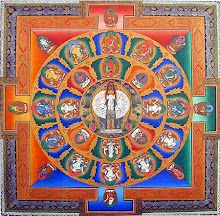




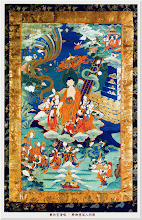

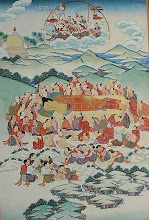


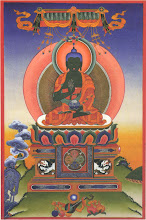




.jpg)

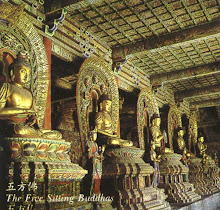













No comments:
Post a Comment